#instead of punishing them for not suffering in the exact ways you have suffered
Text
some of y’all think suffering is a competition and it shows
#this is literally just me thinking abt the post I just reblogged#bc the implicit message of replying to something like what they described#which if u missed the post was like#‘today me and my mom-‘ ‘wow what’s it like to have good parents my mom could never’#that kind of stuff?#the implicit message is wow I am suffering and you have it SO good#it’s an ‘I have it worse than you woe is me’#how silly! how stupid! to rank yourself and others off of a singular experience! a singular factor!#how fucking BANAL to even treat suffering like that#or to treat JOY like that#you dont reward people for suffering and you don’t punish people for joy#and that’s an imperative I’m telling y’all not to do that and not to think like that#I LOVE hearing abt my friends good family stuff#even though mine is complicated as fuck#it’s cute! it’s nice! it makes me happy that they have that!#I’m living vicariously tbh!!#learn to live vicariously through your friends happiness#instead of punishing them for not suffering in the exact ways you have suffered
5 notes
·
View notes
Text
CellbitEng on Twitter did a translation of Cellbit's preface from Sobrevivendo ao horror! Below is the image of the original and then the English translation from them with some minor edits from me.

The Paranormal does not come to our reality easily.
That's how things should be, at least, but Reality is a terrifying, merciless and brutal world. Even the most trained agents, who dedicate their lives to learning special techniques, rituals and combat skills, often cannot face the horrors of the Other Side.
But that doesn't mean we can't connect and have fun because of it. Actually, I would say that Paranormal Order is what it is today thanks to the suffering of many characters that had the misfortune of being born within Reality. They suffer, we suffer alongside them… and for some reason, we love it.
Order started in 2020, with just a horror story I wanted to create with my friends, and today it has become one of the most played RPGs in Brazil. As someone who played RPGs with my brothers even before I started playing video games, even before I learned how to read and write properly, I couldn't feel more proud and grateful of everyone who is part of this story. Both the team that made all of this happen and the friends who lived it all with me, but, specially, to you, who make this world truly come alive.
Sometimes I think about what my 8 year old self, whose punishment meant my parents hiding my RPGs dice instead of a Super Nintendo, would think if he knew about all this. Actually… he would probably be terrified that I saw the future.
And here we are, once again adding a new chapter to this journey. I always see everything we produce for Paranormal Order RPG as a door opening, an opportunity that answers the question: what's the next step that I, as a creator, would love to have as a tool to tell my stories? And "Surviving the Horror", a name that pays homage to the classic video game genre "Survival Horror," emerged with this exact purpose: a way to make stories even more tense, immersive, diverse, and fun. But above all, a way to make the characters I love suffer even more!
We added new origins to the game (including some created by the community itself. Thank you for being so creative!), new subclasses, class powers, paranormal powers, new mechanics, creatures, rituals, and even an entire new class, the survivor. Additionally, I was able to write more narrative details about parts of this universe that I always wanted to delve into, like details of conjuring Rituals and the way the Entities change people.
Besides all this content for the players, to those who prefer to GM (like me!), there are a lot of newer features for chasing and stealth scenes, more depth to the existing investigation mechanics, with also being able to delve into exploring your characters' fears. After all, what could be more Paranormal Order than solving enigmas and facing Fear?
Now, gather your friends, prepare your character sheets and have fun while being scared and moved by your beloved characters surviving (or dying brutally!). After all, the stories are fictional, but the feelings are real.
Rafael "Cellbit" Lange
June, 2024
114 notes
·
View notes
Text
Some Thoughts on Homing Donquixote.
I'll always have a genuine soft spot for Homing Donquixote. So much potential and such an interesting character who has like the fraction of screen time Rosinante had, yet I think about him a lot. I'd love to know what brought about that passion and interest to "live as humans do."
I genuinely feel so sad for Homing and how naive he was, and how Doflamingo grew to hate him for his mistakes. He had such good and pure intentions but total unawaress of the real world and the sins of the celestial dragons in it.
It seems once they were exposed and on the run from reality, Homing started to feel the weight of it all, his mistakes of exposing his family to the world that hated them and the sins the Celestial Dragons carry as well as their own family and just wanted to die to pay for it, but only him not his family.
I love that there's Martyr part about him that completely contradicts the demon Doflamingo becomes. Upon my first watch I got a lot of Christianity metaphors vibes from it (or I'm looking at it way too deep) but Doflamingo screams fallen angel sybolisim so much.
I wonder if in that case, that's something that Doflamingo grew to hate that Homing just suffered and endured the punishment, he didn't fight back. (giving Homing the benefit here is that he probably just didn't know what to do, he was also scared and losing his wife also just left him lost)
But that's probably why Doflamingo hates weakness as well, one of the many reasons, but he never wants be put in that vulnerable and helpless position again. That's why when Trevol gave him power, he took it. Homing had no idea his son had wondered into the evil hands of Trebol, who knew how to use Doflamingo's anger and power but also his need to gain control back over his life because Homing failed to protect him and their family and instead put them in so much danger.
I noticed that just before Doflamingo kills Homing, he gets angrier and kills him when Homing says "I'm sorry you had a father like me." which is probably the last thing he wanted hear because in his mind it justified that Homing was weak and just putting them in danger with his naivety and gentle nature that never fought back.
It's so sad because Homing never stopped loving Doflamingo and was sorry for the hell he had put them through, exact opposite of what he wanted his boys to grow up and experience, I think it's so interesting that at some point, Homing had this moment and dreamed about taking his family somewhere out of Mary Geoise, that the grass was greener on the. Other side, it was better to live as humans do than it is to live as "gods", I'd love so much to know what was it that gave Homing that dream and pushed him to do it.
(it would be so sad if it was because of something a baby Doflamingo did or said, oof)
Anyways, this is my thoughts of Homing Donquixote. He may have had like a minor role in Doflamingo's backstory but I love his character so much and am probably 1 of 3 whole Homing Donquixote fans.
I should start working on something for Crocodile's birthday but the image in my head wants to draw Homing with a toddler Doflamingo now cause I would have loved to seen those happier moments before it all went down :')
I still get emotional over this drawing, I haven't moved on from drawing this.

I think A LOT about Homing hurting over Doflamingo's anger and hatred towards him. :'(
21 notes
·
View notes
Text
tim drake loaded the chunks of evidence he had wasted his summer on, a grueling ordeal into paranoia of the existence of a lazarus pit he had missed nearly six years prior, onto a thumbdrive. he held that hurt in the palm of his hand and let the dark circles beneath his eyes ring into nothing.
the slim hand of nancy van der huis pulling him out, pulling it out of his hand.
———————————————————————
your friends supply the drugs, your good friends stage the intervention.
———————————————————————
“i’m going to hide it where you won’t find it.”
he shrugs, moody cold new england ice to his sublevel floor. not even the gotham heatwave could melt his eyes out.
hers, though, melted gooey and thick.
“i can find anything.”
“not this.”
“nancy—”
“maybe i’ll have you beat this time.”
———————————————————————
she swagger walks backwards, a smooth jolt in her backstep; like she was walking perpendicular to reality. he watched her with a tilted head. she cocked hers to match.
“you have to close your eyes,” she says.
he rolls them briefly instead, but she insists: close your eyes.
———————————————————————
( in darkness, he knows where her sneakers take her. she could not fathom how to step quietly enough for him to not know. still, he sees the way she paws for a hiding place in some calculation of psyching him out, and he pictures double blinds. )
“i didn’t stop you when you were rolling a boulder up a hill this summer.”
( her fluttering hands stopping. starting again. triple blinds. )
“because i knew what i was doing had substance.”
( her dark voice carries across the sublevel and his head instinctively follows. quadruple blinds. )
“because i was looking for a thing that i knew i could find.”
( her dark voice that carries air. )
———————————————————————
“but you don’t look for things.”
( her dark voice carrying the dark— )
“you look for doorways to doorways.”
( —searching for the path it took, she took— )
“until you’re out, ( her sigh, like some boat ceaselessly adrift perpetually, dragged farther out into the current. ) and out, and out . . . “
———————————————————————
“you know the difference. i know you do.”
( was someone coming back for him? yes, that delicate swing to slightness was telltale on his floor — he’d memorized it. he could visualize her walking, swaying lazily, her arms behind her back with a tilted chin and seeking eyes like he’d blocked this scene out. like he was shooting her movie, and she was performing really spectacularly, this friend of his that he couldn’t have dreamed of. this friend of hers that she couldn’t have either. they competed for gravity just to enjoy it being taken away again. they just went around and around. )
“between . . . mm . . . being on the right track and self sabotage.”
( shifting her long, slim legs and staggering her weight to counter that of immeasurable talent; it was hopeful that she was not hard. that she saw cats with the pawpads ripped off and still believed good luck was very real. it was an arrogant notion for her to think that she had any control over the whim of the universe, whatever cruel god was out there exacting punishment until she pointed her bed northwest, but the delusion had a purity in it that he couldn’t replicate. she just wanted some wrong to be righted. didn’t they all? )
“when you know, tim . . . you know.”
( and she was right. )
“you won’t get what you want from this because there isn’t a chance for an answer. you could tear this building down brick by brick and you won’t find what you’re looking for. you’ll just have dirty hands.”
breath escapes his parted mouth.
———————————————————————
“you’re ruled by desire, but you really hate the suffering that comes from wanting. like you want the cake but not the calories. like . . . ”
( she was this carbon copy imprint on the backs of his eyelids; so to say, his permanent hide and seek player. the bonds between his carbon atoms, 1 - diazidocarbamoyl - 5 - azidotetrazole. stress held them firm and they cyclized at room temperature and ate each other’s electrons on their own compound tension. their hands clasped together, as if she had looked down, as if she had clicked her tongue: you know, now that you're here, we should get comfortable, huh? )
“you want to be loved but you don’t want to be known.”
( in where they hit the equilibrium point; wherein the reactants and the products stop blooming and only create free energy. )
“i’m like that. the feeling that i have to make it up to someone. it’s a very transactional feeling. i think all rich kids can be like that. i don’t wonder why we’re all obsessed with paying to be liked, but i let it happen anyway. i pay. i let them pay. well . . . it’s all we know how to do.”
“a secret.”
( she has many of his. she keeps them like a promise. )
———————————————————————
( there is a lull in the dark and he pictures her taking her swarovski teeth into the plush of her bottom lip, fitting manufactured lines in a deep dusted rose. she does that short hum that she does — the pull of her brown brow into dissociative maladaption, into conception, into decision. she decides. he sees it in the space of his skull. he reviews the softness of her decision again and again and again. )
“can i tell you a secret?”
“what for?”
“so i can make it up to you, the fact that you burnt through your summer. your rotten feeling.”
his hands slip out of his pockets and sit cold and beautiful and destroyed at his side.
“that’s not your fault.”
“i know. that doesn’t really matter to me, though. all my action is newtonian.”
( still believed if she did enough, a wrong would be righted. )
“okay,” he says.
———————————————————————
he angles his long body down—
( —and she angles up and smells like boozy cherry and white beaches and the summer he completely blew searching for the search for bomb misconception; which yes, was self punishing and tortuous. and he certainly would have inevitably gotten some win that would have made him realize the futility of this device, but instead he was being led out in the dark by this very slim hand that made things out of nothing. his self evisceration was as arrogant as her luck — both of which were just grapples for some sense of control. they hated suffering but both found it very necessary because they wanted too much. the curve of her hand against his cheekbone to cup away from no one else, she opens her mouth, and then the hesitation audibly catches the soft breath in her throat. )
he turns his face somewhat, still listening—
( —and she shifts her face as well, uncharacteristically demure for a moment. he feels briefly the puppysoft skin of her cheek slightly warm against his. contemplative, very thoughtful, the subconscious and haunting ability she has to stop start all of time for him. the eerie anticipation of a secret, or maybe of just being touched in a way that isn’t derisive or trying to kill him. )
———————————————————————
"hey . . . tim . . . "
———————————————————————
" . . . yeah?"
———————————————————————
the backs of her cold fingers brushed against his jawline, and she pulled no blood from the sheer sharpness of how gaunt he was in the face, and pressed rough fingertips against the other side of his face — the hallow of his cheek, some valley to her adept artisan hands. and he kept his eyes closed because he was taught to find everything out of nothing, because he could have found her needle body in a haystack he was so talented, because her sooty eyelashes fluttered against his cheek like a butterfly wing. tim knew it was a good secret because she was so embarrassed about the act of giving it, but of course he would keep it very safely. there was still the filter of some nodding off, gooey half of a dream between the press of her mouth to his, but it was still violently tangible and slow. he archived the feeling of this deliberation, and then he got lost. doorways to doorways. they were very dark halls, but he didn’t mind the dark if she didn’t mind either.
after all, he thinks he leaned in before she did.
( she tastes like sweet mint. )
———————————————————————
“i could hide here too,” she murmured, “if you want.”
30 notes
·
View notes
Text
Thinking about how when dealing with patients suffering from delusions/dementia the advice healthcare professionals give is to not try to correct the person but to play into their delusions and focus on making them feel validated, safe, and comforted, and redirecting them toward the behavior you want. If they say "I need to go home" don't tell them "You don't have a home anymore, you live in a care facility". Say "I'll drive you home, just as soon as I finish (excuse to make them wait until they forget what they were upset about)". If they say, "I'm worried about my mom, she hasn't called me yet today" don't say "Your mom's been dead for 20 years". Say “Tell me about your mom".
And that's got me thinking... Were the Tallest actually right to deal with Zim the way they did?
When they saw that he wasn't understanding how he screwed up and why he was being punished they decided to play into his delusion. They pretended to view him with the esteem he desired and assigned him the job he wanted and it made him happy. So instead of misbehaving further, he was redirected toward a fake assignment far away where he wouldn't be able to ruin anything important. And for the most part, it worked for the Tallest perfectly. All they had to do was take his calls and periodically indulge him with false praise and Zim stayed happy and out of their hair. It was only when they let the ruse slip and Zim's delusions were threatened that his behavior became a problem for them again. If they'd just been willing to stop by earth in Backseat Drivers or ETF to keep up appearances Zim never would've pulled the stunts he pulled to get their attention.
Meanwhile, Membrane, the smartest man on earth, genuinely believes his son suffers from delusions, but does the exact opposite of what healthcare professionals say to do and puts all of his focus on trying to correct him, which only results in Dib getting upset and acting out. By contrast, Dib himself realizes in the comic Dib's Dilemma that this isn't the right way to deal with someone in distress. When Membrane is upset about the world not being able to see that GIR isn't a cryptid, just a dog covered in honey and dead bees, Dib understands that what he needs is to be told that he's right, not to have it shoved down his throat that GIR isn't a dog either.
And if Dib is able to figure out that that was the right way to deal with his father, what if he were to start using that tactic on Zim? What if instead of constantly provoking and challenging him, he just told Zim whatever he wanted to hear about how smart and superior he is so he wouldn't feel the need to escalate their feuds to prove himself?
78 notes
·
View notes
Text
Reading through people's mcd rewrites there's been one a few that have combined into an idea in my head. (Or someone else had this idea, it cemented itself in my head but I've read so many that I can't remember it anymore, that's also possible.) I've tagged some people down below who's ideas I've kind of combined here! (Please tell me if you'd like me to not tag you, I'll fix it!)
So bare with me while I explain this tragic little idea.
Imagine if every single roleplay was simply a different version of them. Like we step back from Jesson simply using the characters people are already familiar with and instead say that they genuinely are the exact same people, reborn into a new reality.
What if, it all started with the Divine Warriors. What if they were their first, original forms, and they fucked up so badly during their lifetime that the universe or some power higher than the warriors themselves, decided to punish them. It's already canon that the warriors are reborn over and over again and are connected, but what if different realities existed and in every single one, these people existed, and in every single one they were doomed to suffer.
I've seen some people make connections from the different versions of the characters, something to do with their personas, stories, etc. I thoroughly enjoy the idea that though fundamentally different when set into a completely new environment and reality, there's something that always stays the same. Something connecting every version to the first and to each other. Something that still makes the person them.
Back to the point, it would be devastating if every single version, no matter how different or no matter what reality, was always doomed to the same downfall. Cursed with the predestined outcome with no way of ever changing it, chosen for them because of the mistakes of a version of them that is oh so distant, lost to time and space, and they will never be the wiser.
Or will they?
Will they, after countless reincarnations, start noticing? Would so many versions of the same people over and over and over and over and over again start slowly tearing the walls down? Would they slowly grow wiser, faintly starting to remember the other realities, how all of them seemed to end. Would the deja vu slowly take over their lives?
Would they take notice of others being ever changing while some seemed to never change? Garroth, Katelyn, Aphmau, they seemed to always be them, yet Levin, Lucinda, Cadenza never were quite the same...
I haven't finished rewatching MCD and I never finished When Angels Fall so this might not work but fuck it, I like the idea
This heavily relies on @aphblr-headcanons posted hc in which anon talked about each reincarnation having a curse caused by the Divine Warriors.
Along with @goat-guy-tm who talked about Irene incarnations always having the name Aphmau, like a curse.
Honourable mention of @garbagepile who had talked about Garroth's similarities between each universes
And (maybe) finally @dilucsfavorite who's post about reincarnation I had reblogged some time back and which probably sparked this whole thing
#aphblr#aphmau#begging for mcd mutuals#garroth ro'meave#mcd garroth#minecraft diaries#rambling#i went off the rails a lil#this wasn't supposed to be this deep#whoops#divine warriors
32 notes
·
View notes
Text
7 am headcannon time.
Delightful Children style
So In a post I reblogged I mentioned about how I think father came to adopt the delightful children and delightfulize them. I’ll explain a little more on that because everyone had their own ideas on it and I’d like to share mine too.
Tw for mentions of neglect abuse and manipulation, it’s father and his delightful children what did you expect?
Sector z was formed by 5 children who where abused and neglected by their parents aka adults. They where thrown into an orphanage and quickly banded together over their experiences and became inseparable beginning to form their little group. Each of them where in and out of housing and different families all their lives. One of them getting adopted leaving them panicked. The family not ready to take on their new kids issues just threw them back into the orphanage. This happened A lot to the point that they where just not shown for adoption anymore. Wronged by adults they discovered the kids next door who fought adults so they joined asap. This way they where out that retched orphanage as much as possible and never had to be apart again since they where a team. They formed sector z adopting their code name numbers and for a good while where the best operatives there, young adult fighting kids with great skills.
Benedict on his mission to find kids to delightfulize went to the orphanage deciding this would be his best bet. Still under the orphanage and having to go back there every night Benedict took a liking to them he could tell they where different from the others there. He played nice. Very nice. He was kind to them he didn’t adopt them right away instead let them come over to his big mansion house to get acquainted. He bought them toys, chocolates, cloths, comics. When they stayed the night he’d read them story’s and run them lovely hot bubble baths. He took them to the park and out for the day buying them icecream when they went to the beach and played in the sand with them. They thought they’d really found the best father ever and they trusted him all just wanting the security of a good parent figure so they trusted him very fast. Benedict adopted them officially and took them all home, he’d found out about them being knd operatives and couldn’t have asked for better. He tricked them into going into the delightfulization chamber saying it was a new invention of his. Trusting him they went in and before they knew it they where delightful children.
They know their former knd operatives but it’s all blurred and hard to remember or focus on the memory enough to fight the delightfulization so it’s far far back in their heads unable to be accessed But they remember how adults wronged them and so when one shows any weakness they quickly overpower them. Showing they are superior to adults. Their abandonment issues where full swing once delightful which is why they stay together at all times. Their issues remain and they struggle massively with them but father punishes them when they show any sort of struggle. So he abuses and neglects them in the exact same way they where before but their powerless to him and suffer it. He’s nice to them sometimes with their big birthday parties and letting them have what ever they want when they want but that’s just because he’s rich enough to throw them it all and tell the butler to get it for them. They want icecream? Father gets the Butler gets them it. He just puts them in the hands of the maids and butlers to take care of.
I like to think after operation zero however and fighting with his own father again and long long talks with Monty and forced family vacations together he eventually starts to treat them right and make amends to be a good father to them, their still forever delihhfulized and evil little menaces with a taste for chaos but he loves them all the same. Buying them toys, comforting them in meltdown and night terrors patching their scrapes and reading stories to them before bed.
Had to end on a happy note I’m not letting them suffer forever! I might make a few more bits on each of their pasts in my personal headcannons and what not but idk. What do you think on my perspective of it?
#headcannons#theories#knd#code name kids next door#codename knd#kids next door#knd dcfdtl#dcfdtl#the delightful children from down the lane#knd lenny#knd bruce#knd david#knd constance#knd alessandra#knd father#knd benedict#knd uno family#father#tw abuse#tw manipulation#tw neglect#happy endings
39 notes
·
View notes
Text
MLC fic ramble - 《只今》 by
应该没人认出来
ok, since lofter has locked down all posts to people with accounts, I can't do full recs for anything on lofter anymore (i.e., I can't re-read so I can't give specific warnings), so instead I'm just going to ramble about the fics I love and if you are able to access lofter read at your own risk since this is just rambling based on my memory. Keep in mind my general warnings.
The author's summary of the fic is: a fic about what's more painful, losing the person you love or losing their love.
FDB goes back in time and becomes the young master of Wanshengdao in order to save LLH.
Here's the link to the first chapter, but now it just redirects to the login unless you have an account. (*weeps*) Go read if you can!
My spoilery ramblings under the read more:
This fic is AGONIZING. Oh the angst in this! The premise is all knives and the execution was sharp. In the original timeline LLH and FDB were lovers then LLH gives up the Wangchuan flower and leaves as in the drama. LLH dies and FDB buried him. FDB dies (later it's revealed how and it's heartbreaking) and wakes up back at Wanshengdao and this time he knows that LLH isn't going to eat the Wangchuan flower. SO he tells SGD he'll help him in exchange for the flower, and he ends up giving SGD the mother bug, and LLH is aware of the betrayal. He ends up imprisoning LLH so that he can cure him, but Qin Po dies in the process.
LLH escapes. (I can't remember the exact details but it was something like FDB marries LLH - I think SGD intends for it to be a humiliation for LLH - and lets him escape during the ceremony preparations.)
By the time LLH leads a rebellion back it's a couple of years later. He finds FDB blind and imprisoned in the Ji Le tower, dying from having the mother bug implanted in him.
The rest of the story deals with LLH's anger at FDB for what he did in order to save him (and from LLH's pov he doesn't understand why FDB would go to such extremes, since he doesn't know FDB has already experienced his death and knows he won't eat the flower), and LLH's gradual uncovering of the things that FDB did in order to try to save as many people as possible from SGD.
It also deals with FDB's guilt - his decision lead to Qin Po's death, and he also ends up killing government officials (I forget the details but it was later revealed to have been set up by SGD) as part of SGD's coup. So after his rescue he's tormented by his guilt and is very submissive to LLH. FDB thinks LLH hates him and thinks he deserves the hate (from LLH and from all the people he knows - people are calling for his head because he's SGD's son). LLH's angry about FDB's abasement and the way he's subsumed by his guilt and atonement, and is very conflicted because he loves him but also hates what he did.
Finally it deals with the inequality of their position and how that affects their relationship (e.g., FDB's reliance on LLH for his life/ protection, his inability to draw any boundaries because he feels he deserves punishment as well as because he thinks his own judgment is bad).
I love this because it's ultimately about atonement and forgiveness, and about how to live again after something so devastating. The amount of guilt FDB carries and how he works to atone for it - he is a good person who made an awful mistake, and he is trying so hard to make up for it. I loved seeing him slowly understand that sometimes there's no way to pay it back to the person hurt so he can only live and pay back the universe.
There's also a bit of political plotting and FDB gets to break XZJ's sword (yay!). This is huafang but DFS has a strong role as friend to both of them (and has comments about the dogfood he suffers through). So it's not just all angst.
A few warnings for the things I remember: there's an attempted rape (not explicit/ not between huafang), and power dynamics issues because of the imprisoning (both of LLH in the beginning and later FDB) and my recollection was that they were having sex through those time periods so no one was at his best. There also is some issues about dressing up as the wife in the weddings (i.e., SGD intended to humiliate LLH by it, and then later FDB reluctantly wears a woman's outfit when he marries LLH). Again, read at your own risk since this is just the stuff I remember.
9 notes
·
View notes
Text
I absolutely can't write a coherent meta but I have soooo many thoughts about the new TDP short story, "The Queen's Mercy", but this is the part that stood out the most to me:
Kim’dael bowed her head as though the words coiled around her neck. “If you know my name, then you also know of my suffering. For my crimes, the dragons have condemned me—and punished my kin. They drove us out of the Moonshadow Forest, away from our homes, and killed us one by one until only I remained! Still it is not enough! Still the dragons seek my death!”
"For my crimes, the dragons have condemned me—and punished my kin." I bet Aaravos could say the exact same words. The castout. The last of its kind. We know dragons love to punish a whole community instead of the individual - look what happened to Elarion.
Also, this paragraph is so on the nose in the context of Moonshadow elves, who were suppposedly killed and condemned but they provide Xadia with 'protectors' - the Moonshadow assassins.
This. Freaking. Part. The binding.
Aditi tilted her head, unafraid, even as a prick of red blood welled up at her throat. “If you must,” she said. “But know this: the binding around your neck—it is made with magic not unlike your own. It is a magic that demands, that takes. Kill me, and that binding will take you. It will tighten until the life is choked out of you forever.”
Then, Kim'dael asked how to get rid of this binding:
(...) “Ah— a great many things,” said Aditi. “Your hands will take generations to wash clean. And in those generations you will serve me, and my children, and my children’s children, until one of them sees fit to set you free.”
Aditi bound Kim'dael to herself. A Sunfire-type bond, created with the influence of one's heart. Another Sunfire creature whose heart was important was the Magma Titan. The heat of Aditi's heart put Kim'dael in chains that will remain on her through generations. The heart of the Titan threw chains on Harrow, Viren, Sarai and Amaya and their children.
Runaan bound himself, the assassin’s and Rayla to their mission.
'Until one of my children's children sees fit to set you free' Janai is clearly the one who sets the humans free from the chains of history, the clearest evidence being her forgiving, falling in love and marrying(!!!) Amaya, and by this she extends her forgiveness to her nephews - Callum and Ezran. Similarly, Rayla was the only one who was able to free herself from the binding, saved by Zym's mercy.
However, there is one more living descendant of Aditi - prince Karim. Perhaps he is the one to get in touch with Kim'dael and set her free? Another important aspect of their possible relationship is blood. Karim has drawn his blood to declare the "War of Blood and Ash", the ritual that Aditi, the merciful queen declared illegal.
Lastly, what caught my attention was the fragment about magic:
"it is made with magic not unlike your own. It is a magic that demands, that takes."
Magic that takes. But "taking" from the primal source feels way too simple here, for some reason... A magic not unlike Kim'dael's own. My first and only thought: dark. But we can't be sure...
55 notes
·
View notes
Text
The Trolley Problem in SMTIVA and why I keep choosing Dagda
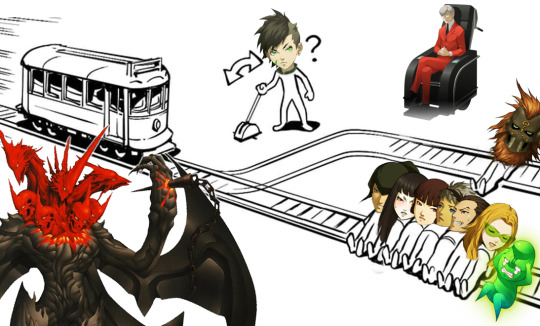
There are several ways one could analyze Danu and Dagda's philosophies (and in far more detail) but for this post I'll be talking in a simple and straightforward way through Pros & Cons with in-game evidence.
Personally, I see Bonds and Massacre's essential difference standing on 'I care for the now' and 'I care for a future with no suffering'.
-----Bonds-----
The price:
- Dagda is replaced by a Dagda shaped by Danu
- Humanity will continue to depend on religions thus the cycle of suffering continues for both humans and those who rely on human understanding (gods, angels, demons etc)
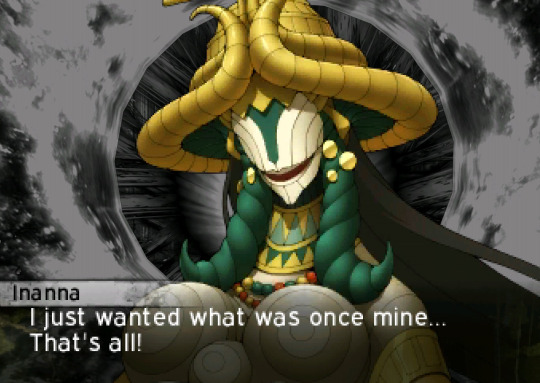
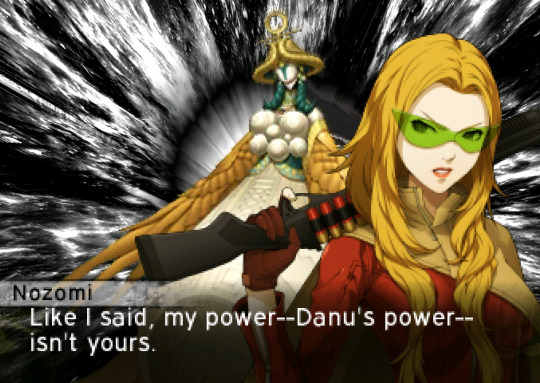
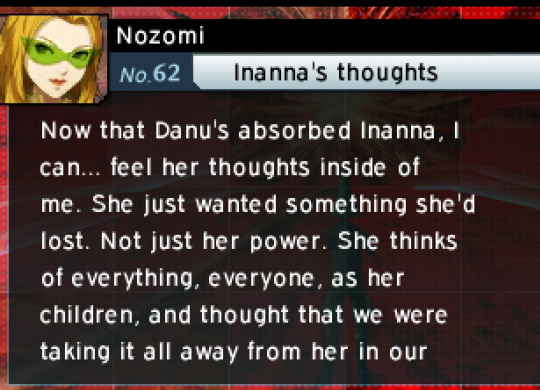




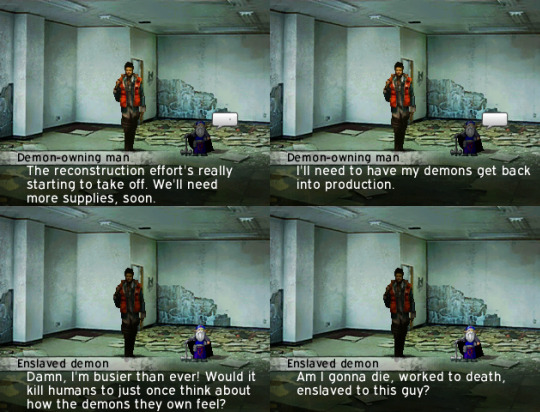
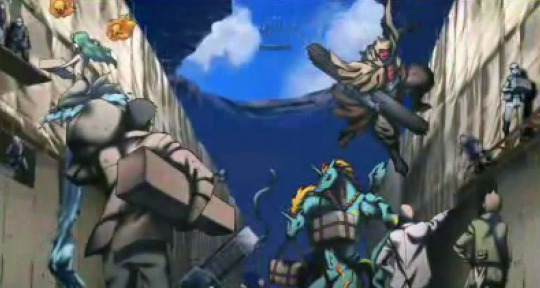
But you get!
- The souls that were going to build the Cosmic Egg are set free
- All of your teammates are alive with their sense of selves intact

It's an ending that favors the human side as it doesn't put the focus on blaming the humans but 'bad and tyrant' gods. Even though they become bad specifically from the observation done by humans.
Gods and demons will continue to exist by being observed and exploited and blamed on for their misery. But for Nanashi what matters is that his friends and allies are well and working together. For now.
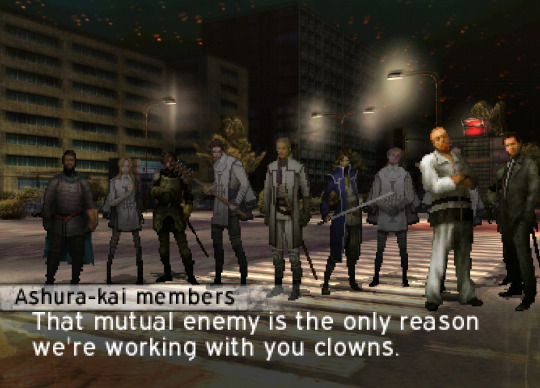
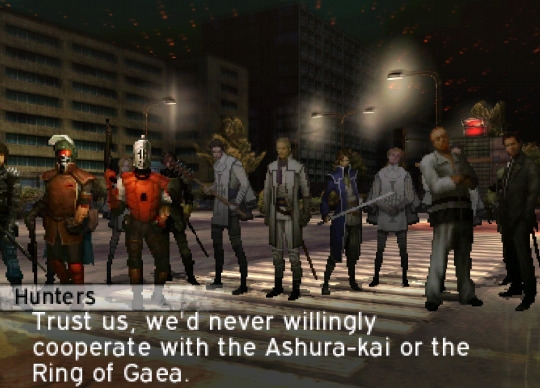
-----Massacre-----
The price:
- Human souls will be sacrificed to build the new Universe
- Your teammates are alongside the sacrificed and if revived, have a different sense of self

But you get!
- Dagda stays as the original Dagda
- Humanity will become independent and self-sufficient from religions, sets free those who rely on human understanding (gods, angels, demons etc)
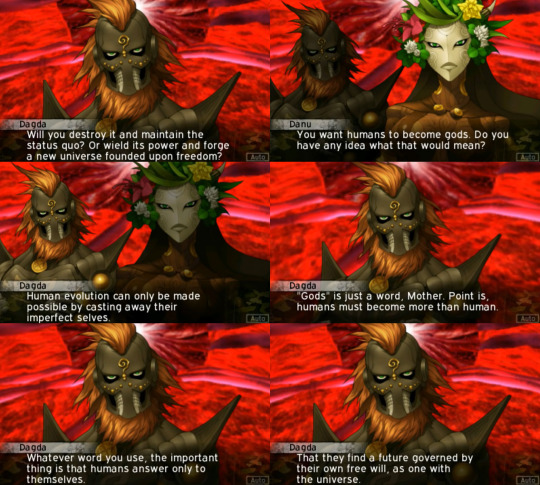
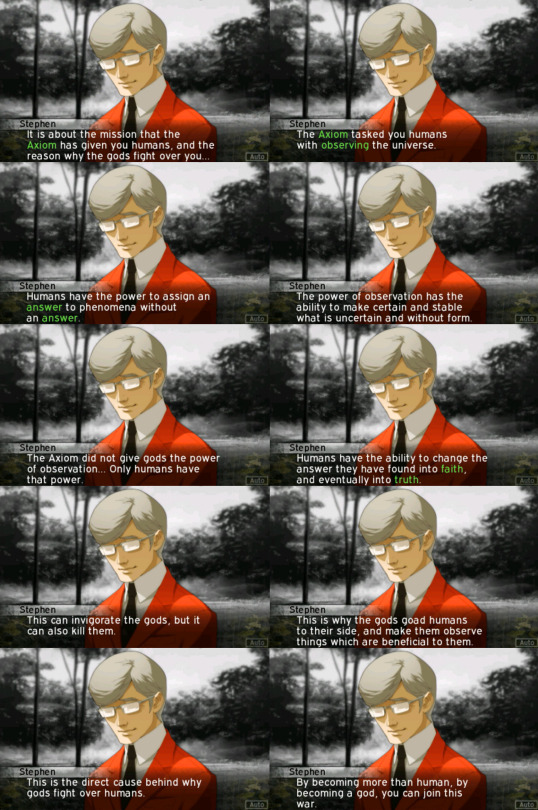
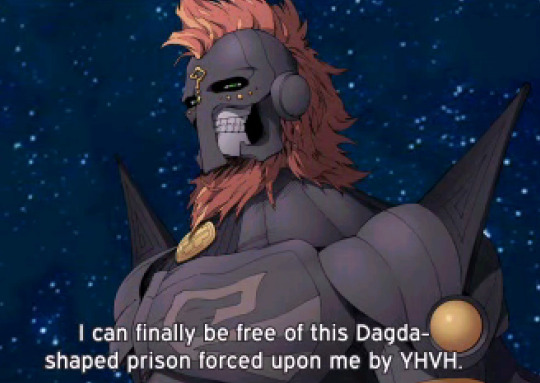
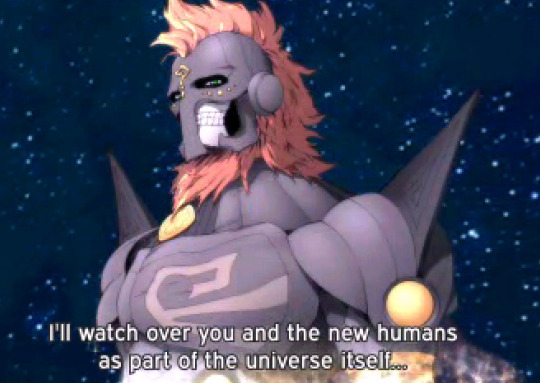
Here, Nanashi accepts solitude and taking on Dagda's god position for a future where religions and myths become pointless. No biases or influences that could twist the original nature of the world anymore so new humans will be born with unlimited potential of using the truth of the world for themselves instead of leaving it at the hands of deities. Unless an exterior force comes.
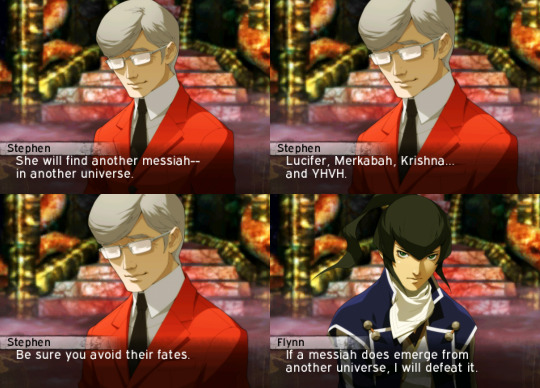
It's important to keep in mind that as cruel for his methods Dagda is considered, he doesn't favor a specific religion or way of thinking like how Law does and just wants Nanashi to avoid the root of his problems: the observation done by humans. To consider Nanashi as if he could be a second YHVH is to go against what Dagda is preaching for (and Dagda will still watch you as he disappears).
The best argument for this is shown in this summary from page 110 from the SMTIVA artbook (translated by dijeh):
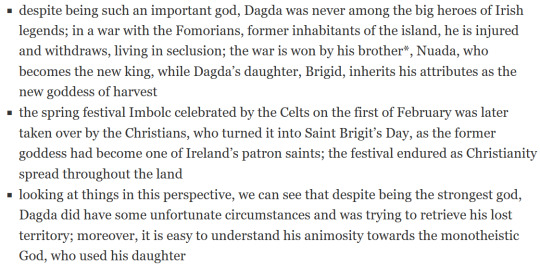
As sidenote, while Brigid isn't shown in the main story, she has a cameo in Tír na nÓg (aka the DLC area where Dagda makes it available for you to train), in which Nanashi can meet various Celtic figures from pre-Christian Ireland:
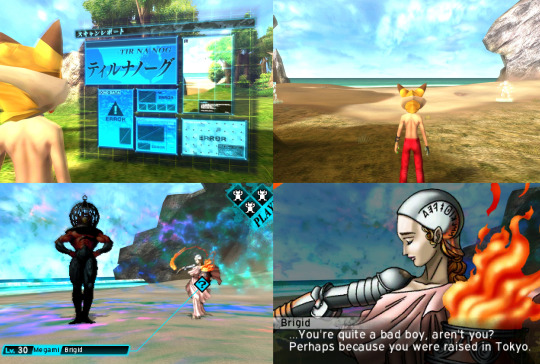
So if you are going to point out Dagda taking advantage of the mental state of Flynn and your Goddess, just scroll up and look again at what Danu does. They use the exact same method, with the real difference between them is that Danu's solution is an endless cycle of punishing and policing ideas that will keep being reborn from humans while Dagda wants to give future generations of humans the power to not depend on religions and on the same line, towards gods and demons the freedom of expectations to conform to what humans demand of them.
The irony is that Danu's kind and wholesome outcome favors way less groups in the long way than Dagda's despite the game constantly throwing at you that he is the most self-centered of the two.
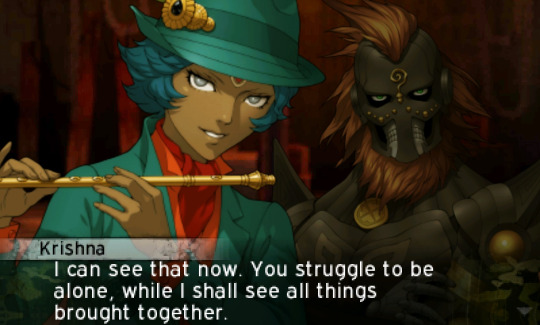
Krishna, the most fitting force to compete against Law and Chaos since hinduism is one of most popular religions (approx. 1.2 billion of adepts), advocates for the pagan religions to side with him so each gets its own slice of followers for a world order of polytheism instead of monotheism. It's an ending that favors deities associated to polytheism.
Dagda does the opposite to Krishna: 1) uses the fact he is not a very well-known deity and hides in the Axiom from interference from other people and YHVH himself until he could meet someone with a powerful will as Nanashi so he can 2) force all deities and demons altogether to return to the nature.
Dagda's ending strips the powers and authority of all religions and gives them to humans.
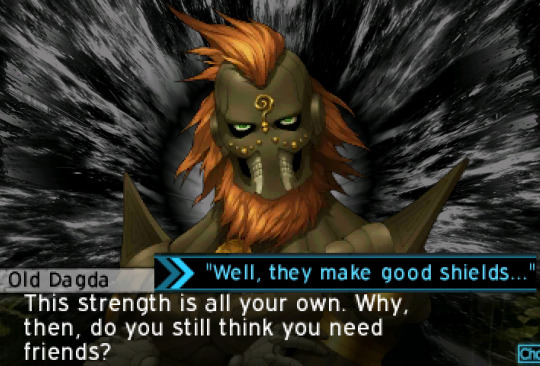
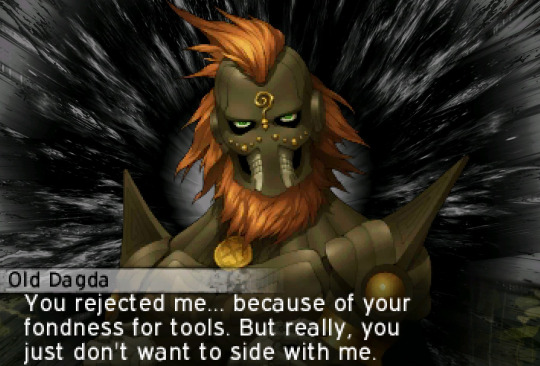
Now, obviously we also count that how a player considers the 'price' and the 'reward' will commonly vary from the theory (f. e. players picking a side for liking or disliking a character regardless of the meaning behind their alignment or viceversa).
In fact, SMTIVA validates this option as you can still see Nanashi being able to choose dialogue where he looks down on his teammates while also disagreeing with Dagda.
Meanwhile, Nanashi in Massacre is able to show compassion when parting ways with them as well.
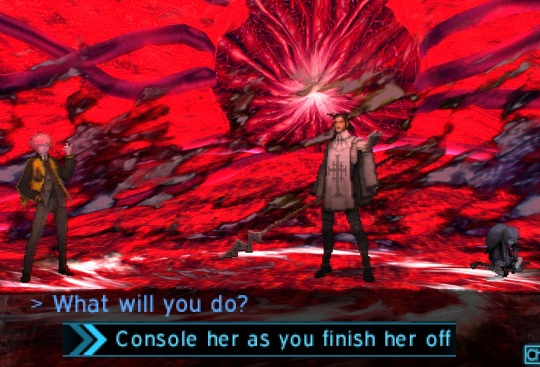

In other words, there's no such a thing as a route where Nanashi is 'locked' into a single type of personality. Nanashi can canonically choose a route for ulterior reasons beyond what Dagda or Danu originally wanted them to be.
The duality of being friendly out of selfishness or being aloof out of not wanting to be heartbroken are all possibilities.

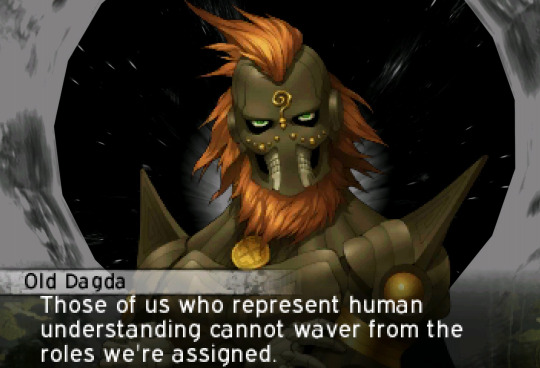
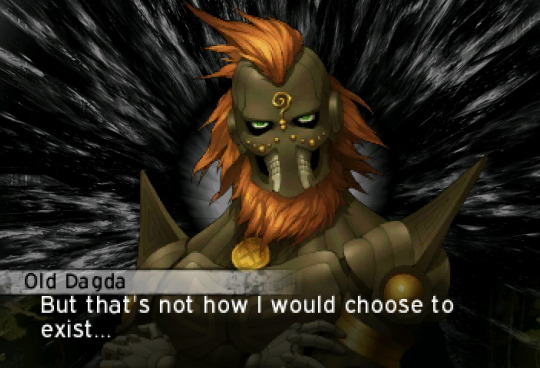
One could even say that the latter is present in Dagda himself, particularly from the ways you might be able to view his relationship and treatment of Nanashi.
To put it simply, the perspective of Dagda seeing a son in Nanashi after getting distanced from his daughter and Nanashi seeing a father in Dagda due to his orphan background and rather... unbalanced dynamic with Asahi and Boss.
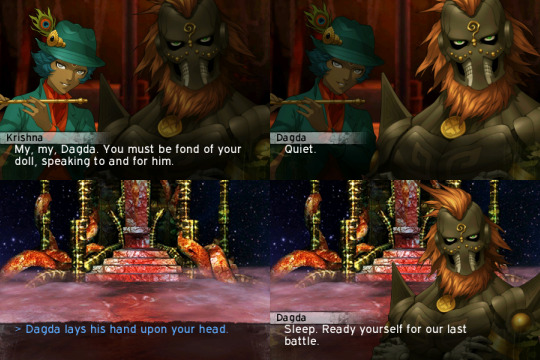
As how a certain quote goes, the opposite of love isn't hate, it's indifference. Taking into face value Dagda's grievances with influence caused by bonds with other people is similar to villifying the Chaos side without understanding the nuances of Law being what demonized it in the first place.
Dagda is intentionally made to be the bad apple of the game as a smokescreen for the player.
17 notes
·
View notes
Text
Aziraphale is Lucifer, Sauntering Back Upward
There's an amazing meta post about Crowley being Lucifer, and it got me thinking about the nature of their own rebellions. I love the idea that Crowley is Lucifer, and I totally think it fits, but he's a a version of the Adversary seen through a very Jewish lens, possibly even placed there deliberately by God herself as a sleeper agent. (I'm not placing Good Omens God as the good guy here; the whole point of the show is that neither side is good or bad, they're just sides to be on.)
In Judaism, Ha-Satan is an Adversary in a way that translates to "The Opposing Advocate" or "The Prosecuting Attorney" (Hebrew is Really Old and only has so many words to convey concepts), and his actual job, as appointed by G-d, is Asking Questions. He's appointed to do that. He's one of the mazikim, an angel who does G-d's dirty work of testing, tempting, judging, and destroying (I know Neil knows what this is, he named a character that!). And why was Crowley placed as the Tempter of Man? Well, he's really good at asking questions. He was turned into a demon because he had a lot of questions.
The assumption is that this is a punishment.
Job also thought he was being punished, but he wasn't. He was being used as a test because he was such a great example. Crucially, the Jewish interpretation of this story is not about trusting G-d and being rewarded or whatever, it's "Being very good doesn't mean that you'll be rewarded on Earth, it means that you'll probably have an even harder time here because G-d is using you to prove something." The double livestock and children are not meant to be a reward, they are due compensation for damages. (The Mishnah says equal cost, but I think Pain and Suffering counts for an awful lot in this case, so it's only right that he gets twice the livestock.)
Whereas Aziraphale, actually? Is not only a Christian angel, but a Christian Lucifer who is sauntering very slowly downward. A Lucifer whose job is not to ask questions, but who actually tests the angels themselves and leads them to rebellion.
(Additionally, I think it's really funny that Aziraphale and Crowley are having the exact same argument as G-d and Satan in the Book of Job, which is that it's very easy to do the right thing if you're rich but hard if you're poor, but they pick a very poor person instead of a rich one and end up taking everything away from her, and she's tempted to suicide. Great job, Aziraphale. Proves my point.)
Let's look Before the Beginning.
The first line in Genesis is about G-d creating the heavens and the Earth. So this is obviously even before "Let there be light," Market Version. The Miltonian War in Heaven takes place before that, so obviously this is before the Earth even happens. So what's Crowley doing, speaking the Divine Command when the Earth isn't around yet?
Well, without God looking over his shoulder, he's setting the stage for things like matter and energy to even be able to exist before the Earth even has the conditions to form. He's disbursing the Divine Light that's contained in the now-shattered vessels of the Sfirot.
Rav Wikipedia sums it up thusly: 'Because the sephirot are pure and unrelated to each other at this stage, each attribute alone is unable to contain the enormity of the Divine light as it descends into them, and the "vessels" (Keilim) of the sephirot undergo a "shattering" (Shevirah), creating the World of "Chaos" (tohu). Their Divine light is released and reascends, while the broken vessel fragments descend, still animated by "sparks" (Nitzotz) of light."
So, Crowley summons that Divine Light, it Big Bangs out and shatters existence into being, and Divine Light shoots out all over the place. Now, in medieval Kabbalah, this separation was considered to be a result of humans sinning, but in Lurianic Kabbalah, which is a reaction to the very beginnings of the Spanish Inquisition (the thing that got Crowley so upset with humanity), it's a necessary part of Creation. Divine Sparks being trapped inside the shards of the vessels it was stored in and forgetting what they were is necessary for consciousness that's not just a part of G-d to exist.
That's Crowley's job. It's necessary. We used to believe this was a mistake, but turns out it's not! This cosmic separation is actually really important, otherwise the Divine Sparks cannot forget their origin and experience individual consciousness and thus free will.
"In the Lurianic scheme, Creation is initiated by a primordial radical Divine "self-withdrawal" (Tzimtzum), forming a figurative "empty space/vacuum" (Khalal) in which only an "imprint" (Reshimu) remains of the withdrawn Ein Sof."
Compare this to Crowley and Gabriel's discussion of their lack of memory feeling like a house where furniture used to be. But also, consider how out of touch Crowley is with the whole Divine Bureaucracy at this point. He's clearly been left alone to do his own thing and hasn't heard what's going on in the scheme of things.
So what's Aziraphale doing there? He's just blithely winging his way across empty space, a little spark of light, when Crowley calls out to him. He doesn't appear to be doing anything more urgent or important. He comes over, asks what's up, and Crowley gives him a task -- holding the blueprint while he activates it into existence by turning a crank. Crucially, Crowley needs somebody to help him bring existence, as imperfect and chaotic as it is, into a place where it can even start to think about being. Trapping the Divine Spark in matter.
This is real fuckin sexual. It suggests Hesiod's placement of Eros as an act of attractive, sexual love as the beginning of existence, but also it's a pretty obvious sexual pun.
(The Gnostics would identify Crowley as the Demiurge for this, but we're not talking about them. I don't think Neil is trying to do anything with Gnostic mythos here; it would be a lot more obvious if he was.)
What is Aziraphale's response to this? He's disappointed that Crowley is praising Creation instead of praising his own personal beauty. It's only a second, but wow, how petty can you be? Someone has just unleashed the full beauty of the first moments of existence before you and you're like, "Wait, I'm pretty, too!" I mean, you did just metaphorically cum existence into being and I guess you're stuck in the wet spot, you could use some aftercare.
That sounds a lot like Milton's Satan. He's the prettiest boy in Heaven, and his whole thing is that he's not impressed by humanity and they should be worshipping him instead of him having to serve them. Aziraphale is a little jelly of Creation from the very start. So jelly, in fact, that he starts talking shit about it. Oh, this? Yeah, it's not that important. It's just a backdrop for humanity. Yeah, some little apes on an unregarded little blue-green planet far out in the uncharted backwaters of the unfashionable end of the western spiral arm of the galaxy. That's what this is all about. Yeah, uh-huh, sucks to be you. Well, I wouldn't do anything stupid like raising a fuss about it. Oh, you're gonna? Ooh, don't, it's pretty dangerous. Little old angel like me could never. I don't even know what gravity is.
And yeah, maybe he was sent there to give Crowley the news in the first place, but still.
(@mischief-and-tea-by-the-sea , who suggested I tag @neil-gaiman , also points out that many interpretations suggest that Milton portrays the Fall as a Felix culpa or necessary fault, a planned thing like the shattering of the Divine Vessels in Lurianic Kabbalah -- both are necessary for independent consciousness to exist.)
God could have totally sent him to check up on Crowley, not just inform him of the new developments in the plan. Oh yeah, that one nerdy angel who got all geeked about nebulae. He's gonna flip his shit when he realizes this isn't going to run long enough for any new stars to form. Let's send my insecure little gay gossip over to see how he takes it. Ooh, he came right the fuck up to my office with a serious attitude. I mean, I don't wanna deal with that on a daily basis, but he's making some good points. I need to put him where I can use that attitude and also not have to deal with that attitude...
Not only that, but Aziraphale gives fire and the first weapon of war to Adam. These are traits identified with Prometheus and with Azazel, another name for Satan, in two different traditions.
One common interpretation of Milton is that his sympathetic Satan shares traits with Prometheus, acting as a bringer of enlightenment and a heroic figure to humanity, risking his angelic status for actions that will ultimately free humanity from the yoke of the gods. Prometheus risked the wrath of Zeus to give fire to the humans and was punished endlessly for it, and is prophesied to someday rise and do battle with the forces of Order at the end of time. Prometheus is also associated with the human brain and toolmaking (because of the fire), as well as being ultimately responsible for Pandora, the First Woman, who likewise doomed humanity because of her curiosity and disobedience of the gods.
According to the Book of Enoch, the angel Azazel, another name for Lucifer or Satan (I think by now it's pretty clear that Satan is just gonna be whichever angel is being an Adversary at the time, but w/e) was the leader of the Grigori, the angels who lusted after humans so much they decided to fuck them. Azazel personally taught them smithing and how to make weapons of war (and makeup; Aziraphale does love disguises and sleight of hand). Very Promethean. Aziraphale didn't Fall then, true, but he's also Human Gay. Possibly because his first individual experience was being attracted to (and, uh, Used for Cranking It until Creation exploded into being by) Crowley. Regardless of how much agency he had in his Gayness, he probably brought humanity the gift of Gay Sex and thus avoided having any Nefil babies that had to be drowned like half-tabby Siamese kittens in the Sandman, so he didn't Fall then either, but gee it was a narrow miss. He must have been worried about what else God could do to angels, which is why he was so terrified about his child-saving lie with Job.
(Of note is that literally the only remotely Biblical book that refers to an archangel rebelling directly against G-d for the Throne of Heaven is the Book of Enoch. Yep! Just there! It's not a Jewish belief at all, along with the idea of Original Sin or the snake being Satan--that is your Animal Urge, and it's necessary to live but you should not let it control your behavior, in Jewish thought.)
And the thing is that he does Fall a little after lying to God. She never speaks to him again, so he's left in constant doubt and has to be forced to make his own decisions, just like a demon. He obviously never tells any of the other angels, just Crowley. But you can see his anxiety about this constantly, and I bet there's a little part of him that wonders if he's actually Fallen and somehow nobody has noticed yet, but worries that the moment they do he'll be officially kicked out of Heaven. That's gotta be so, so bad for you.
But there he sits, acting as an angel, irritating the other angels to the point of extreme measures simply by being himself, the way that Crowley does to humans and other demons with lots of thought and cleverness.
He even offers Crowley the temptation to defy God's decision and take control in Heaven. Yeah, Crowley is horrified by the idea, but he's gotta stop and think about it for at least a moment, right? Crowley just didn't take it because he sees beyond the system. He already knows that the sides are bullshit in the same way I told my Christian classmates that they didn't need to worry about devils because they were really still just all angels and Hell was obviously a lie to keep them under control. (Mazikim!) Crowley wasn't tempted to take power because questioning the System is literally his job right now.
He obviously corrupted Gabriel by being so clearly in love and enjoying himself on Earth. Gabriel has his clothing tailored special and wants to save it, just like Aziraphale, even though he doesn't give a shit before. He wants to stop the Apocalypse and keep things status quo, even though he didn't before -- that's Aziraphale rubbing off on him. He wanted to meet his Hellish counterpart in a place where humans eat and drink, just like Aziraphale. And he decided that he was going to fall in love with his counterpart and even start enjoying music, just like Aziraphale, and face exile with graciousness just like Aziraphale.
Aziraphale literally tempted Gabriel to Fall. He didn't do it by asking questions, just by being himself. Enjoying things. Enjoying clothing and music and love and Earth and peace and the status quo. Indulging himself and his desires above serving God or, frankly, the humans. (Yeah, I know, he tries when he bothers, but he's still a lazy, petty bitch who prefers his personal drama and own sense of comfort to nearly everything else, and he barely tries to hide it. That's why we love him.)
And now?
Baby is Supreme Archangel. And he's gonna defy God about it. This is everything the Miltonian Lucifer ever wanted.
42 notes
·
View notes
Video
youtube
Metroid Other M Part 4: Permission to not boil alive, Adam?
Yeah let’s do this
Let’s talk about the Authorization Mechanic
So instead of having to find her lost upgrades all over again Samus still retains most of her stuff from Super, but Adam says they’re off limits until he gives her permission to use her own stuff
Let’s first analyze this thing from Adam’s perspective
On paper it should make sense: Samus is, as he puts it, an outsider to his platoon. I don’t know a lot about military procedure, but I’d say it makes sense for a military officer to keep a tight leash on the weaponry used by someone who’s technically outside of your group. Unfortunately this logic crumbles to sub atomic matter when you think about it for even a fraction of a second
First off, something that many have already pointed out: half of Samus’ upgrades aren’t even dangerous, her Varia and Gravity Suits are purely defensive upgrades there’s literally no reason to restrict their use, as is the case for the Space Jump and Grapple Beam. At this point I’m surprised he doesn’t have to explicitly authorize the Morph Ball.
Secondly: his logic is that he doesn’t want to risk Samus accidentally frying his men or damaging the Station, yet upon authorizing her weapons he has no qualms allowing her to keep them. What exactly is the difference? If you deem something like the Plasma Beam too dangerous to use regularily then you should tell Samus to shut it off as soon as the situation that demanded its use is cleared. I’m not saying I would have wanted the mechanic to work that way, God no, it’s just that this defeats the whole point
And lastly: it just flat out makes no sense. Literally. Adam’s men are almost never around Samus through most of the mission so they’re almost never in any danger of getting in her line of fire, and the only weapons in her arsenal that can do some serious damage to the Station are Power Bombs and maybe the Wave Beam, which passes through walls and may accidentally hit someone or something without Samus realizing it. There’s nothing else in Samus’ arsenal that can pose a genuine danger to the Station’s integrity
Adam accidentally comes off as incredibly inept and far too fixated on military protocol to properly command the mission, which is the exact opposite of how Samus describes him in Fusion and even this game
There’s another pov through which to see this and that’s the idea that Adam is purposefully ordering Samus to limit herself as a way to punish her for leaving his command years ago
I don’t know if this is exactly the angle the game is aiming for but it wouldn’t surprise me, given how coldly he treats Samus at the start of the game, and the whole angle the game has with Samus and how much of a “child” she is for disobeying her father figure
In this case then Adam’s actions are downright disgusting, you’re essentially telling me that he’s still keeping a giant grudge against Samus after all these years for the grave sin of wanting to strike out on her own, so now he’s gonna punish her by hammering down his power over her in any way he can, with said punishment including having a harder time fighting deadly bloodthirsty creatures and literally boiling alive in a volcano until he decides Samus has had enough. And by the end he doesn’t have any sort of development, he just goes from an absolute cunt to a somewhat self sacrificing cunt who gets praised left and right for who he is, what is the moral here? That Samus deserved all that he’s put her through? That in the end he forgave her for her transgression? Absolute horseshit
And I know that’s not the intention! I know that it wasn’t Sakamoto’s actual intention to imply that Adam was having fun watching Samus treck through Sector 3 without her Varia suit, thus having to suffer in the excrutiating heat. I know this because later on, when you fight the Nightmare, Samus does not activate her Gravity Suit during the first battle even though Adam had disappeared earlier and she had even decided to ignore his orders by activating her Space Jump and Screw Attack. These instances are nothing more than the game wanting to create unique gameplay situations without the use of specific power ups. Having to do a Hell Run for a while is an interesting idea gameplay-wise, but for a game that’s so story focused and makes a big deal out of wanting to fuse the gameplay and the story with details like the UI elements (like your amount of health) remaining consistent between gameplay and cutscenes, this is absolutely disastrous! Because there’s no way I can ignore the fact that Adam is seemingly ok with Samus boiling herself alive! And no, don’t tell me “In the japanese version he tells her to only explore the areas she can currently enter with her current equipment” because he also says this in the english version and it still doesn’t solve the problem! At the start of the game he specifically shows that he’s connected his monitor to Samus’ visor so he can see everything that she sees, meaning he saw her ignoring his orders entering a super heated area yet said nothing until it was time to fight a boss. I can’t even say that he might’ve been busy with something else because early in this Sector he authorizes use of the Ice Beam, leaving the only logical conclusion that he saw Samus burning alive and didn’t care. Unfortunately this is what happens when you don’t proof read your writing enough. This feels like Other M was so hellbent on aping Fusion’s story that it copied Adam’s characterization throughout that game literally...completely forgetting that Adam in that game spends most of his time being a villain, and that what we see for most of the time is not his true personality, as his memories of his original self were implied to have been repressed by his programming until Samus accidentally unlocked them. Plus his orders in that game have a mostly negative connotation, he’s framed as a hostile figure for bossing you around and Samus finds ways to violate said orders which ends up saving the day in the end, unlike this game where the story can’t detatch its mouth or Samus’ from his cock
And then there’s Samus herself
I won’t spend much time repeating what everyone has already said ad nauseum, how she’s pathetically submissive and weak and how questionable it is to have a situation where a woman is characterized as being mostly submissive to a strong male figure who literally holds her life in his hands yet the plot wants us to think it’s actually for her own good. No I’ll leave that part for later in the playthrough, when it will be more appropriate
For now I wanted to focus on an alternate take about Samus in this game that I’ve seen floating about.
Some people say that in the Japanese script Samus is not submissive at all! She’s actually rather rebellious! The reason why she accepts to obey Adam’s orders is mostly out of spite, she wants to show him that she can handle this mission just fine with the limitations that he’s imposing upon her. The reason why she goes through the hell run is because Adam tells her to “only go through the areas she can explore with her current equipment” in the japanese script (he does it in the english one as well guys...) so she says nuts to that and goes through an active volcano without proper protection just because she can!
I...don’t see this anywhere in the japanese script? Maybe I’m just missing something, or the translation is imperfect but whatever, let’s say that this is indeed the direction the script is going for, it would certainly make sense after all to turn Samus into an irresponsible brat that feels that she needs to prove herself instead of taking the mission seriously in a plot that also wants to hammer home the point of her being a child
You do realise that this doesn’t fix anything right? She just goes from being a submissive idiot to an immature one, in fact it might even be worse in some ways
Ok look: I realize that some poeple like to say that you can’t really cry mischaracterization for Samus here because Samus had no real character in the previous games! She was a mute character that barely emoted and had only the barest of personalities right? You can’t say that Other M writes her badly because she was barely written in the first place!
...you know what? Let’s play this game! Let’s analyze Other M’s portrayal of Samus while ignoring every other game in the series! Let’s take it completely on its own merits!
...and also Fusion’s
Because unlike most other games in Fusion Samus spoke quite often, plus this game wants so badly to be Fusion 2.0, so I think it’s only fair to compare the two!
So Samus is just trying to prove herself by obeying out of spite right?
Well she’s an irresponsible moron and also quite the opposite of how she acted in Fusion
She’s effectively putting her own personal game with Adam before the success of the mission, a mission mind you that has her searching for survivors on an infested space station where a government conspiracy is going on, complete with a secret saboteour going around killing Adam’s men one by one
Literally every second that Samus wastes fighting some alien creature increases the possibility that someone might die, either a survivor or one of the team. The logical thing to do would be to say screw you to Adam and activate all of her power ups so that she can steam roll everything and get this shit done much more quickly and efficiently, but she seemingly refuses because she wants to one up Adam?
Samus is practically playing with these people’s lives by not taking the situation seriously, she’s endangering people’s lives by purposefully not giving it her all
Look at when she got pinned down by the Mystery Creatures while the rest of Adam’s crew were fighting against other monsters: she still refuses to use her most powerful skills to break free and help those guys either because she’s an idiot who needs daddy Adam to tell her that she’s pernitted to defend herself properly or she’s an arrogant fuckball who thinks that showing Adam that she can beat this thing even while underpowered is more important than saving these people’s lives, thus artificially lengthening the conflict and forcing Anthony to step in and rescue her while he himself was busy fighting off those creatures, thus putting him in more danger.
Btw according to the recap for this part Anthony saved her from “certain death”

Not a good look there Sammy
What about later in the game when she meets the Deleter for the first time?
She can’t directly hurt his mech with her Ice Beam, so she relies on destroying its power source, yet by the end it still has enough juice to make a run for it, allowing the Deleter to escape.
Gee, maybe this wouldn’t have happened had she used her Plasma Beam, y’know her most powerful Beam weapon, capable of going through the armored hides of robotic enemies in gameplay destroying the easily? So either she’s an idiot who can’t think for herself waiting for another idiot who’s watching everything unfold while doing and saying NOTHING, or she’s a jackass who purposefully held back on a traitor who had already killed at least one member of the team, causing him to escape and then kill yet another member of Adam’s squad and even make an attempt on Adam’s own life! Good job Sammy!
Now let’s see Fusion: that’s the game that introduced the idea of Samus having a bit of a rebellious streek, she flat out admits that she dislikes following orders.
The difference is that in that game her reluctance to follow orders isn’t born out of a sense of immaturity or a wish to prove how capable she is to her senpai. It’s because she puts more emphasis on her own judgement than that of others, if she finds the latter’s flacky, while also often being born out of sheer pragmatism
When she acquires the Plasma Beam, the Diffusion upgrade and unlocks Security Level 4 against Adam’s wishes, she doesn’t do this out of childish spite, but because she NEEDED those things to survive and improve her chances of completing the mission. Samus in Fusion takes the mission very seriously, she knows the stakes at risk, and every time she disobeys Adam or butts heads with him it’s not out of brattiness, she doesn’t do things to say “look at me I’m so cool and independent!” but rather because if she feels like Adam’s orders aren’t sufficient to fulfilling the mission then she’s gonna do things her way.
Some might say that it’s not quite the same situation: in Other M she’s dealing with the real Adam with whom she has personal history, but as I’ve said Samus takes the mission extremely seriously as explicitly shown in Fusion where she was perfectly willing to blow herself up with the Station in order to kill the X and stop them from infecting the rest of the universe. Hell even in Other M she still takes the mission seriously most of the time, but you’re telling me that she makes an exception with Adam’s authorizations because she’s got a bit of a grudge(?) going on there? I’d maybe (MAYBE) be willing to sort of accept this facet of her personality, if the story did something with this idea of Samus being kind of childish deep down whenever Adam is involved
...but the game doesn’t do that. She doesn’t really evolve or learn anything, in fact if anything the story pretty cynically seems to double down on the idea of Samus really being an immature child playing the adult role. Nothing of real value is added by introducing this concept, mainly because the game thinks that adding as many “weaknesses” to Samus’ character is the key to making her look deep while unfortunately forgetting to find a good balance between her weaknesses and her strengths, not realizing that there’s a difference between a character being flawed and a character being ineffective...
...but that’s for another time...
4 notes
·
View notes
Text
TUA and the horrible no good very bad apocolypse
Watching the decline of writing from season 1 to season 3 had already cued me into the fact that season 4 would be, objectively, a poorly written mess littered with plot holes, character inconsistencies, and confusing/poorly-established lore. But, at least, I figured it would be campy. Fun. We’d get a catchy soundtrack and a cheesy little family bonding moment, actualizing the themes that have been present since season 1, and some fun edits of Five killing people. Instead we got…. Petty drama, irrelevant B-plots, whatever was going on in that subway, the continuous undermining of Klaus’ character, a lack of catharsis, and… an apocalypse that turned into the exact antithesis of what it was established to be (narratively and otherwise) in season 1.
Season 1, objectively speaking, is the best written: borrowing the premise from the comics, it has the most material to work with and the most leeway for establishing character beats, tone, and setting up expectations for their audience. The storyteller is expected to STAY CONSISTENT with all of these things, or else the story loses emotional appeal. Why would you remain invested in a character who you can’t even define? This season is my favorite because of just how intertwined and water-tight everything is. Right from the beginning, character relationships are established, along with the REASON for these relationships: the siblings are estranged because of the abuse they suffered at the hands of their father; Luther and Allison have a strange tension that comes with being forced into narrow and isolating circumstances; Luther and Diego argue over their position on the team, or rather, their father’s approval; Five, suspended in space and time, understands the incredulity of Klaus’ circumstances which establishes a baseline for their mutual understanding; Viktor is isolated from everyone on the team because he was isolated from them by their father. There is all an identifiable, obvious cause for their behaviors and character quirks. The abuse they suffered is, in some ways, indistinguishable from their development; all of them struggle to function in normal society, and this is a point that is repeatedly hammered down. Allison struggles with her ex-husband and her child; Viktor stumbles through his relationships and ends up falling into another cycle of abuse with Leonard; Klaus is addicted to drugs. And this is all painfully, painfully relevant to the elephant in the room:
The apocalypse.
My favorite storytelling device, what have they done to you. From the beginning, it lurks in the shadows of the plot, a constant threat to us viewers and Five - the only two who know the severity of the situation. It is, I imagine, quite like the anxiety of an overbearing father waiting around the corner, dealing out cruel punishment. The end of the world is vague and unknowable. We don’t know what causes it or how to stop it: only that it will destroy us all. It serves to raise the stakes of the story; but what separates the apocalypse in TUA is the reason that it happens. The end of the world comes about, quite simply, because a selfish man abused his children. This is INTEGRAL to the apocalypse story-line. The apocalypse being a result of the abuse suffered by the umbrella academy is the perfect intersection of all the character’s storylines. It combines Allison’s eagerness to rely on her powers the way she’s always been taught, even at the expense of other people, with the isolation and gaslighting and apathy leveled towards Viktor, and their father’s mysterious death, and Five’s reappearance in the timeline. The common denominator here isn’t Viktor, it’s Reginald Hargreeves. At the end of the day, the apocalypse doesn’t happen because it’s unstoppable. It doesn’t happen because it’s a force of nature, or because that it’s ‘fated’. It isn’t vague and unknowable or otherworldly. It happens because Viktor makes a choice. He didn’t have to do what he did; he was hurting and traumatized and overwhelmed with the magnitude of his powers, obviously, but he ends up perpetuating the violence done towards him. The apocalypse happens because a man was selfish. It is entirely preventable, and incredibly unfair, which is what abuse is. Reginald Hargreeves the father of child abuse and crimes against women did not HAVE to do any of that, but the consequences of his continuous decision to inflict harm against his children are what eventually cause the world to end, with powers that he (presumably, at this point) has something to do with. Narratively, the apocalypse represents a system of abuse which perpetuates itself. It seems unstoppable. It seems like it never ends. It seems like Viktor is “always the bomb.”
But I think we should remember that this is also said by Five who, at this point in the story, has every right to be frustrated by his siblings being morons. His brother almost ends the world twice, and that hopelessness is very understandable. This does not, however, make this an objective statement. I don’t think Viktor is “always the bomb” because there’s something fundamentally different about the abuse he suffered, or because there is something inherently ‘wrong’ with his character (wouldn’t that be interesting. Wouldn’t that be a totally not contradictory totally not poorly thought out totally not poorly executed plot point. Being born inherently wrong. That would be crazy right) but because he’s the only one with the ability to do that. The specifics of his circumstances lend themselves to violent outbursts. Suffering is cyclical, and the past is just waiting around the corner for you to slip up. The apocalypse is always there, waiting, because of a choice Reginald Hargreeves made thirty years ago.
By season 2, we had practically abandoned the interpersonal relationships the siblings had with each other (said by a person who enjoyed season 2 generally). Viktor completely forgets everything, erasing all of the character growth he’s gotten up to that moment. Five spends the entire season in a panic-stricken frenzy trying to get his family home, but his efforts go (again) acknowledged (just like the apocalypse trauma that they no longer care about). Allison gained the most from this season, which unfortunately tied a lot of her character to a very specific point in the story to people who are not main characters. They’re all separated, estranged, again. And it’s starting to get a little tired. But, of course, that’s how living is. Frustrating and tiring. The problem is they never address this estrangement, they don’t come to any meaningful conclusions, they don’t improve their relationships. They just keep piling character plots and trauma and then addressing none of it. And this time… the apocalypse is less appealing. It has nothing to do with the way the characters feel, or how their past is intersecting with their present. It feels less like a haunting than it does a… plot device, conveniently in place to force the story forward. The story had lost a lot of its emotional appeal because it literally did not give me time or space to process the emotions that were there, and the narrative was now no longer directly tied to the main motivations of those characters. Now, we muddy the waters: the apocalypse happens because at a certain important time in history the American government finds Viktor and the cold war is happening and you’ve kind of lost me. This apocalypse means nothing to me. Five doesn’t even react to it, while in season 1 he was having full-blown panic attacks. Sure, Five is still flighty and paranoid and violent and neurotic, but most of these traits stay surface level and unexplored; and when the emotions and relationships of the characters bears the burden of the narrative, that is… not ideal. It weakens the stakes.
Season 3 was generally agreed upon to be a mess. Which it was. There were moments I enjoyed, but I lacked the emotional investment from season 1 because the emotional investment just wasn’t paying off. They set my expectations for the characters to have plots which resolve their conflicts and then drop them, forget about them, change their characters so those plots no longer matter. And this, too, is reflected by the apocalypse we get, and the solution. Personally I didn’t enjoy the ending of S3, but there was a LOT they could have done with that concept. Showing how they adjusted to having their powers taken, when their powers are they reason they exist, when their powers are the reason that they were taken by Reginald, when they’re intimately tied with their personalities and experiences and livelihoods. We could have had discussions about what the implications of this fairy tale dream world are. The world is your sandpit or whatever. Instead we got…. Season 4.
The apocalypse is back on. Again. It looks a little different this time. I do not care. The weight of the apocalypse has changed. It no longer represents the suffering of their family, and the possibility of perpetuating that trauma, but a “big evil world ending threat” that has lost all of its narrative meaning. The characters don’t even care that the world is ending - why should I? The story doesn’t have the characters finding meaning in the face of their hopelessness. They don’t even fight it. I watched six episodes of the most absurd, unpleasantly miserable episodes of this… for what? For them to die at the end because of something inherent to them? The apocalypse happens regardless of how they try to change, regardless of their efforts, regardless of the way they’ve scratched and clawed and fought their way through life?
And then it’s framed as a good thing and not a tragedy? And REGINALD FUCKING HARGREEVES gets to live? The one responsible for all of it? Narratively, he gets to live happily ever after with his wife who I also do not give a fuck about, while the people he victimized take the blame for his actions? That’s the message we’re sending here? Maybe if this was framed as like. Hey isn’t this fucked up. Instead we get the One True Paradise timeline and it’s just like. Oh my god. What the fuck was that. And nobody even remembers them. Nobody reconciled. Nobody finished their character arcs. Nobody got catharsis. I didn’t get catharsis. Why would you write that?? Why would you write that????
Anyways kids always remember: you were traumatized for the crime of existing and you should actually just kill yourself because the world will be a better place without you in it !!!
#tua#tua season 4#tua season 4 spoilers#what was even the point of that.#if you were just gonna retcon everything#I just. switching the framing from the apocalypse being the consequence of good ol Reggie being a bitch and the lasting consequences#to it being about how they're inherently flawed and that existence is better off without them#all that struggling. all that fighting. it was all for nothing#and i'm supposed to think that was some heroic sacrifice#every day I wake up
3 notes
·
View notes
Text
youtube
Frost
(poetry by Romildo Risso, music by Santiago Chalar)
Life deceived you, you say;
Pitiful excuses.
Who told you August* was summer?
You believed in a little heat out of season,
And you alone deceived yourself.
Life didn't lie.
We all know it has no fixedness, no constancy.
Sometimes the creeks dry out,
Sometimes, the fields flood with water.
You had your illusions,
The exact same thing that happens to everyone;
And just like the way your sprouts are right now,
Their hearts end up like they are made of rags.
How many out there like you!
All self-affliction,
All cursing fate and disgrace,
And instead of toughening up in the face of punishment,
You get so scared that your blood curdles.
Don't blame life, my friend;
Life knows not of intention.
Cure your ignorance, your laziness,
And you'll make good out of even a beating.
Little loss the blossoms you have lost,
When Spring is around the corner,
And for what you might have suffered,
Pretend this winter has just lasted a little longer.
You will go on recovering slowly,
And what mankind cannot do,
Must be achieved though new leafing;
Hearts are not made anew.
But beware!
Don't get too excited;
When you feel that a warmth fills you,
On any November* day a frost might burn you.
And to survive that one...
To survive that one,
I cannot tell you the power that is needed.
If you feel it in your roots,
Let whatever God sends come.
Get deep into your roots, grab with them tight,
'Cause there is where your strength lies,
And not in the branches.
But live warned,
That hail is in the skies, and the white clouds.
When you expect the hit,
It hurts less than if it finds you with the flesh relaxed.
And unless you pretend to be privileged,
You will have to suffer, the hail, and the frost.
Have memory,
That life teaches,
And have endurance,
That suffering doesn't kill.
*The poem is set in the Southern Hemisphere; think August=February, November=May.
#heladas#santiago chalar#romildo risso#I think about this poem every time a frost is forecast in Spring#Funny because people be like#latinos! joy! dance! hope!#Uruguayans: but what if life SUCKS and it's cruel and meaningless#This time it's striking me as a Percival-at-his-worst post-suicidality#it's about the gloom and self loathing mixed with a desperately calm pep talk#and the fear of hope#Youtube
12 notes
·
View notes
Text
The Road Forgotten - Chapter 11

Pairing: Arthur Havisham (Dickensian) x OFC
A/N: I made Arthur bisexual and paired him with a female character in this. I know some writers have gotten flack for pairing Arthur with a female character (or reader), so if it's not your cup of tea, please walk away.
This is mostly based on the events of "Dickensian", but I've also incorporated some elements and characters from "Great Expectations". Most notably, Satis House is in Kent (as in the book) instead of in London.
Summary: A few years after his plan to swindle his sister ended in tragedy, Arthur Havisham is a shadow of a man, living in guilt and fear. When Elsie Bradford, a young woman also wronged by Compeyson, enlists Arthur's help to hunt down his former partner-in-crime, Arthur must face his demons and other strange, new feelings, to redeem himself.
Warnings: slow burn, angst, guilt, revenge, psychological trauma, mention of prostitution, mention of suicide/suicide ideations, some violence, a bit of smut
Chapter word count: 2.6k
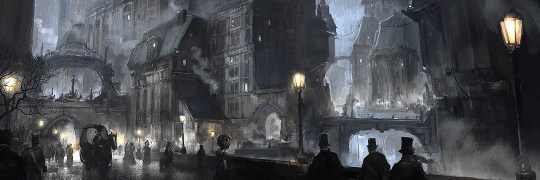
Chapter 1 - 2 - 3 - 4 - 5 - 6 - 7 - 8 - 9 - 10
Chapter 11
The next morning, they took a stagecoach to Arthur's hometown in Kent. There was no sign of Cyclops and the Chimney on the streets, and Elsie hoped against all hope that they had been arrested the night they attacked Arthur. They would not stay in jail for long—Mrs. Hill would see to that—but they would be off her back for a while.
Elsie held Arthur's hand the whole way. She could tell he was nervous, even more nervous than she had been the day she took him to see Marianne. Now she understood his horrified reaction to Marianne's condition. He had seen the same thing with his own sister, Amelia. From what Arthur told her, Elsie understood that Amelia wasn't in as bad a state as Marianne—she had suffered greatly and had become reclusive, but she hadn't lost her mind. However, Arthur couldn't say what the exact nature of Amelia's condition was, not having seen her since Compeyson left her at the altar five years ago, and Elsie didn't want to press him. He was already crushed by the guilt of having introduced Compeyson to his sister.
"It wasn't your fault," she kept telling him. "You couldn't have known what kind of man he is." He said nothing to that.
What he did say was that he believed Compeyson might have some genuine feelings for Amelia. "More than once he spoke highly of her to me, when he had no reason to do so," he said. "She was—is—very strong-willed, my sister, and he might have admired that. So perhaps he told her something in confidence, something that will give us a clue as to where he is."
They arrived in a market town set amongst the coastal marshes of Kent, only twenty miles from the sea, as Arthur told her. Elsie fancied she could almost smell the salt air even from here. She had never seen the sea.
It took them about a quarter of an hour to walk from the High Street to Arthur's childhood home, Satis House. "The name means enough," Arthur said with a hollow laugh. "What a cruel joke. None of it was enough. Not for me. I didn't even know what enough was. And I'm punished for it." In the past few weeks, he had started to carry himself with more confidence, to walk straighter, and his eyes no longer darted around wildly. Now, as they drew closer and closer to the house, he seemed to revert to his old self, his shoulders hunched, his feet dragging, his eyes fixating on something only he could see. What horrors did this place hold for him? How much did it cost him to bring her back here?
As the house came into view, Elsie's heart sank. It was a large mansion of old brick, with such a dismal prospect that she felt weighed down with an incredible melancholy just to look at it. Rusty iron bars surrounded both house and courtyard. Two great chains draped across the front entrance, some windows had been walled up, and those that remained were barred as well. The whole place looked abandoned and condemned. She couldn't imagine anyone living there.
"This is where you grew up?" she asked.
Arthur nodded, his brow darkening. "She only had it boarded up after Compeyson—but it has never been a happy home, even before that."
Her heart brimming with sympathy, Elsie reached for his hand and pulled him to her, but he didn't melt into her arms as he usually did. He stood stiffly at the gate, looking up at the house with a mix of fear and loathing.
Elsie rang the bell. A window was raised, and a small voice came out, "Who is it?"
"My name is Elsie Bradford," Elsie said. "I wish to see Miss Havisham about a man named Compeyson." Arthur had asked her to make no mention of his name.
"A moment, please." The window was shut again, and stayed shut for a long time, certainly much longer than just a moment. At last, a young, terrified-looking girl, no older than thirteen or fourteen, dressed as a maid, came across the courtyard with keys in her hand. She paused upon seeing Arthur with Elsie, confusion and suspicion chasing each other across her plain features.
Arthur shook his head at the girl. "Miss Bradford will see Miss Havisham alone," he said.
"You're not going in?" Elsie asked.
A sad smile flickered on his face. "She won't see me. And she won't see you if she knows you're with me. I'll wait for you at the inn."
As Elsie slipped through the gate, Arthur held on to her hand. "Elsie?" He had never called out to her so tenderly. She turned back. He looked at her, his brown eyes huge and imploring, sending that familiar stab of ache through her heart, while his hand squeezed hers with such a force she'd never felt from him. "I love you," he said quietly.
Those words knocked the breath out of her. She couldn't think of what to say, and the maid was urging her inside, saying, "My mistress is waiting, miss." Arthur dropped her hand. When she looked back, he was gone, hurrying back the way they came as if all the ghosts of this place were chasing after him.
***
The maid led Elsie through a side door and into a dark hallway, lit by a single candle that only seemed to exacerbate the darkness rather than relieve it. After being outside under the brilliant midday sun, Elsie felt like she was going blind. Once her eyes adjusted to the gloom, she glimpsed, through a door left ajar in the hallway, a large dining room containing a long table, spread with plates and bowls as if for a feast, but everything was so rotten and hung with cobwebs that it was impossible to distinguish one dish from another. A grandfather clock stood against the wall, its hands stopped at twenty minutes to nine.
The maid held the candle to guide the way up a dark staircase and down another dark passage, before stopping in front of a door, which she knocked lightly. "Come," a voice said from the inside, sounding as rusty and cobwebby as the house itself. The maid nodded to Elsie and beat a quick retreat, taking the candle with her. Elsie opened the door with a palpitating heart, wondering what she would find behind it. Would it be another madwoman, driven out of her mind by the evils of Compeyson?
She found herself in what appeared to be a dressing room. It wasn't a small room, but the tightly shut windows, the heavy furniture, and the half-packed trunks full of dresses scattered about made it look oppressive. There were a few more candles here, though they did little to lift the stale airlessness of the place. Most of them were placed on a dressing table around a gilded mirror, their flickering flames reflected in its dusty surface and shining down on the other items heaped haphazardly on the table—jewels, some trinkets, gloves, a handkerchief, a prayer book, a bouquet, all dead and brittle, and, most baffling of all, a single shoe, its white satin yellowed with age. It was because of the glare of the candles and the confusion of these items that Elsie didn't notice right away the person sitting at the table, and probably wouldn't have for a long time, had the person not moved. She only saw a pile of white satin and lace and silk in an armchair in front of the mirror, and almost jumped out of her skin when a hand emerged from it to lift up a long white veil, and the face behind the veil turned to look at her.
The woman couldn't be much older than Arthur—in her early thirties at the most, and her face was unlined still, but her hair, studded with flowers, was white, and her skin was white, almost as white as her splendid gown—a wedding gown, Elsie realized with a sinking heart—so she looked almost like an old woman. Her figure, too, was shrunken, and she moved with the jerkiness of an automaton, her joints and muscles had seemingly forgotten how to work from lack of use. Only her dark eyes retained some sign of life as they stared at Elsie, unblinking.
Since the woman showed no inclination of speaking up, Elsie had to speak first, but she found her voice had stuck in her dry throat, as if this house had infected her with its curse. Finally, she managed, "Miss Havisham, my name is—"
"The maid told me," the woman interrupted. "I don't often permit strangers to see me, but since you mentioned—" Her face twisted like one being forced to take a bitter pill, and her voice caught. It was a while before she continued. "So you have fallen victim to him as well, haven't you? Tell me, is your heart broken?" she said, peering eagerly at Elsie.
It was such a strange question to start that at first, Elsie didn't quite know how to answer, but then she remembered that Arthur had asked her the same thing in the Three Cripples, the day they first met. What could she say? Her heart was broken, but not in the way Miss Havisham meant. Her heart was broken because Arthur had just said he loved her, but she couldn't say it back to him. It was broken because she wanted to love him but couldn't, not when the black abyss that was Compeyson still threatened to swallow them up. She couldn't say any of that, so she opted for a simple, "No."
"It is a pity," Miss Havisham said. "Have you loved?"
Elsie decided to tell the truth this time. "...Yes."
"I don't think so," the old-yet-not-old woman scoffed. "If you have loved, then your heart is broken. Because that's what love does to you. Because to truly love, you have to give up your heart, give it up blindly, devotedly, give it up despite the whole world telling you otherwise, give it up until there was nothing left—as I did!"
Elsie thought of Arthur, of the way they held on to each other, making each other feel safe and wanted and comforted, asking for nothing in return, and she felt sorry for Miss Havisham, who would probably never understand it.
"You're wrong," she said. The words came out sharper than she'd planned. "If a person just gives and the other takes, then that's not love, that's a robbery."
Amelia Havisham laughed, a dry, brittle sound, like the dead bridal bouquet on her table. "Well, I can't deny that. I was certainly robbed." She looked at Elsie. "If your heart is not broken, then why do you wish to speak to me about him?"
Elsie had been preparing a speech in her mind, hoping to appeal to Miss Havisham's sense of compassion and sisterhood, but now, faced with this specter of misery and malevolence, she wasn't sure if the woman had any compassion left. So she spoke plainly. "Compeyson murdered my father and drove my sister mad," she said. "I wish to seek revenge."
"Revenge?" Amelia repeated. "Yes, I want revenge as well. But why stop at seeking revenge on him alone? Why not seek revenge on the whole world, on those despicable men and the pitiful women who allow themselves to fall in love with them?"
Elsie felt exasperation building up inside her. A penchant for wallowing in their own misery and talking in rhetoric seemed to be a Havisham specialty. She had managed to get through to Arthur by being direct, so she would have to do the same with Amelia.
"Miss Havisham," she said firmly, taking a step closer. "I'm sorry for what Compeyson did to you, but I'm not here to discuss it. I'm looking for him. If you know anything about where he might be, please tell me."
Amelia turned away. "I know nothing."
There was no chair for Elsie to sit on, so she knelt in front of Amelia to look into her eyes. "Miss Havisham, please. Your brother told me—"
"Brother?" Those dark eyes, looking disconcertingly like Arthur's, at least in their shape and color, were vacant. "I don't have a brother."
Elsie was momentarily confused, but she told herself this must be why Arthur felt so guilty, why he hadn't been back here in five years. His sister couldn't forgive him, so in turn, he couldn't forgive himself. "I've been to see Mr. Jaggers and Compeyson's wife, to no avail," she said. "Did Compeyson ever tell you anything about his home or mention any place he often stayed at?"
Amelia recoiled slightly at the mention of Sally. "I remember his wife," she murmured, lost in memories. "I met her once. She told me she was his sister." She lifted her eyes to Elsie's face. "Do you see? She lied for him. She is one of those pitiful women too. Like me."
It dawned on Elsie then, that this was another lost cause. Amelia Havisham had nothing for her, except to serve as a grim warning of what could happen if she let grief and hatred take over. She might not have locked herself away in a rotting old house with a frozen clock, but didn't she put her life on hold as well? Didn't she allow Compeyson to continue tarnishing everything in her life, long after he had gone out of it? Didn't she deny herself a chance to love and to hope?
She thought of Arthur, with his sad eyes and sweet smile, his soft lips and strong hands, and it was like the sun had suddenly come out. A glow of love and affection surged up within her, spreading from her heart throughout her body, sending warmth to even the tips of her finger. She loved him. She could admit that now. She loved him, for all his faults and his weaknesses, because he saw her and knew her and stayed by her. She remembered his suggestion that they built their own castle, and realized she wanted nothing more than to build it with him. The past was the past. She was done with it. She would not let Compeyson pull them into the abyss like all the others.
Filled with a new sense of determination, Elsie got to her feet.
"Well, thank you for your time, Miss Havisham," she said, backing out of the room. "I'm sorry to have disturbed you." She turned on her heel, eager to be away from this house and back into daylight, back to where people still lived and loved, instead of existing in a self-imposed limbo. She could already imagine how Arthur's face would light up when she told him...
"You mentioned my brother," Amelia said, causing her to turn around. "So you know him?"
"Yes." And I love him, Elsie thought, and I'm going to tell him so, and we'll go away together and put this whole miserable business behind us. "He has been helping me."
"Has he now?" There was a dark fire burning in Amelia Havisham's eyes. "I would be careful if I were you, Miss Bradford."
"Why?" Elsie didn't like the way Amelia was looking at her, full of a keen hunger for something she couldn't quite understand.
"Did he tell you he helped Compeyson as well?"
Elsie froze.
"That's right," Miss Havisham said, obviously taking a malignant enjoyment in the shock on Elsie's face. "My brother conspired with Compeyson to swindle me. My brother broke my heart. They both did." Miss Havisham gathered her shroud of a dress about her, and Elsie realized, with a rising sense of horror, that the phantom in Arthur's nightmares was none other than his own sister.
Chapter 12
29 notes
·
View notes
Note
hey, i've always loved reading your meta's on the arrancars! you're really doing a great job at writing about them.
i'm curious, what are your thoughts about loly and menoly and their relationship with orihime ?
Ohhhhhh boy....
The major thing that defines Loly and Menoly's feelings towards Orihime is jealousy— and not quite in the way you would think.
I've seen a lot of takes that the two of them envied the attention Orihime got from Aizen, but I think that misses the mark a bit. What they want isn't Aizen himself. It's safety.
Orihime's presence goes against the fundamental rules of Hollow society, including the ones that Aizen himself has established. From an Arrancar's perspective, she's a weak little human girl with no combat capability, useless in every regard. And yet she's the one who their supreme, all-powerful leader is treating like she's special. Aizen's favor is what keeps Arrancar alive. If Aizen thinks one is interesting and worthwhile, that Arrancar is going to survive a lot longer than once they no longer serve a purpose to him or hold his interest.
Loly and Menoly are clearly toward the bottom of the Arrancar social pecking order. They're not particularly strong or useful; just two more random Numeros who will go unnoticed and unneeded until someone stronger ends their lives like it's nothing. As it always is for weak Hollows, they're worth nothing. They're too weak to matter in the kill-or-be-killed world that Hollows can never escape.
And then they see Orihime, weak, human Orihime, by all regards even more worthless than they are, receiving Aizen's favor and interest.
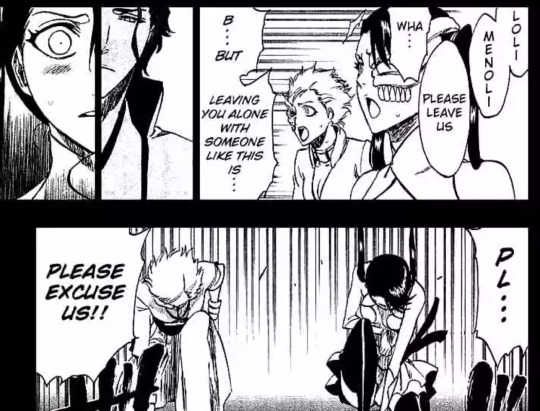
They're desperate. In this first panel, they're trying to show their worth— they're useful to keep around, see? They're displaying loyalty, and instead of a positive response, all they get is obvious displeasure, and Aizen immediately switching his attention back to Orihime.
That situation makes it very clear where their worth stands in comparison to the human, and Loly and Menoly can't take it. They have to live in perpetual fear of being thrown away for what they lack, and then Orihime, who should be even less valuable than they are, effortlessly gets exactly what they've longed for.
Hollows operate through a logic of violence, stronger-and-weaker, hurt others before they can hurt you— and that's what Loly and Menoly do next. Their attempt at threatening and tormenting Orihime comes from a mindset of "might makes right". Strength is what proves an Arrancar's worth, and by that logic, intimidating their enemy, at the very least, can reassure the two of them that they're not so worthless, after all. That they're at least stronger than her.
No doubt, Loly was the mastermind of that whole incident. While they're both in the same situation, Menoly is a lot more accepting of her weakness. She doesn't have the same "something to prove" attitude that Loly does, and that attitude is what led to the incident.
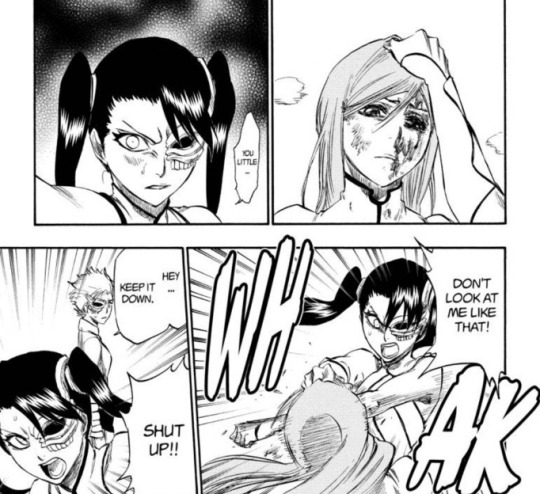
Here, Orihime doesn't fight back. In a situation where she should be threatened and fearing for her life, she's not reacting. Loly desperately wants to believe that it's just because Orihime is too weak to defend herself, but there's a part of her that can only see it as the exact opposite— that Orihime doesn't see her as a proper threat, and thus, feels no need to retaliate. If Loly's anger isn't something to be afraid of, of course she wouldn't need to protect herself.
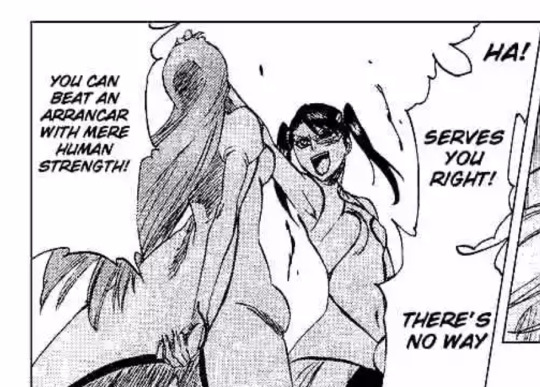
No matter how hard Loly tries to enforce that she's the strong one here, she's too insecure to fully believe it. She knows that Orihime is the one who's worth something between the two of them. Aizen favors her. Her life isn't truly at risk, and in the end, Loly's the one who will suffer for hurting her. This moment of superiority is a temporary comfort in a world where she's bound to always lose.
Menoly fears that punishment a lot more. She's more conscious of their position as disposable. But Loly can't take that. Especially when Orihime repeatedly defies all expectations, and drives in over and over again that Loly's the one who's truly losing. In the end, the two of them hate Orihime out of envy. They can't stand seeing a human get the favor from Aizen that the weakest Arrancar would kill for, and they lash out because of it. It's not personal— Orihime is just a living representation of the terrifying, inescapable reality that they don't matter. And she also happens to be an easy target.
55 notes
·
View notes